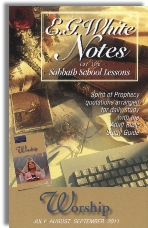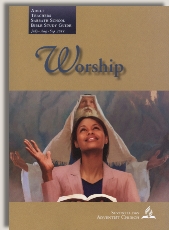|
||||||||||||||
Commentary on "Worship in the Early Church"
Day 3: Monday, September 12, 2011 - The Preaching of the Word
Overview
This lesson begins by pointing out the central role that preaching the Word has in the Protestant worship tradition. This is true, but it is also an incomplete understanding of the proclaiming of the Word. Proclaiming the Word is not limited to the sermon in the Protestant worship tradition. The liturgies and responsive readings present in churches are drawn from the Word of God. Even traditional hymns, beginning with the Reformation, emphasize proclaiming the Word. Proclaiming the Word is continued through Scriptural readings, sometimes including multiple passages such as readings from the Old Testament, New Testament, and one of the Gospels.
The lesson continues with a reading and discussion of Peter's sermon on the Day of Pentecost and looks to this sermon for lessons that we can apply to worship services today. While there are multiple lessons we can apply from examining Peter's sermon, it is important to be clear that his sermon was not part of a worship service. This was an evangelism sermon to Jews who did not yet believe in Christ.
Observations
The idea that "nothing's more important than what is preached from the pulpit during the worship hour" stems from several fallacies. The first, mentioned in the overview, is that the proclamation of the Word in worship is limited to the sermon. Because the Word should be present throughout the worship service, participants can be spiritual fed from the Word even when the sermon isn't outstanding. The second fallacy is that we are gathering to actively worship God, Who is passively receiving our worship. God is with us in worship. What we receive in worship is not limited to what our fellow worshipers, and even leaders, provide to us. We receive blessings and grace from God directly in worship as well. The sermon is important, but this importance should not be over-emphasized. Nor should the remainder of the worship service be seen as somehow less important. In more personal and practical terms, how many times have you found yourself humming or singing a song from the previous worship service? Is the lasting impact of that song not as much or more than what was said during the sermon?
The lesson lists the elements of worship as music, liturgy, prayer, the Lord's Supper, foot washing, and preaching. It is informative to compare this list with the New Testament descriptions of what occurs during worship. There are only a few verses describing or teaching about worship in the New Testament and from these we observe a few consistent themes:
- The Lord's Supper was an important, regular part of believers gathering together; although foot washing is never specifically mentioned as part of this celebration.
- Preaching and teaching was a consistent part of this worship.
- Prayer is a regular part of these gatherings.
- Song is also mentioned as part of corporate worship.
Acts 2:42 And they devoted themselves to the apostles' teaching and the fellowship, to the breaking of bread and the prayers. 43 And awe came upon every soul, and many wonders and signs were being done through the apostles. 44 And all who believed were together and had all things in common. 45 And they were selling their possessions and belongings and distributing the proceeds to all, as any had need. 46 And day by day, attending the temple together and breaking bread in their homes, they received their food with glad and generous hearts, 47 praising God and having favor with all the people. And the Lord added to their number day by day those who were being saved. (ESV)
Acts 20:7 On the first day of the week, when we were gathered together to break bread, Paul talked with them, intending to depart on the next day, and he prolonged his speech until midnight. (ESV)
I Cor 11:17 But in the following instructions I do not commend you, because when you come together it is not for the better but for the worse. 18 For, in the first place, when you come together as a church, I hear that there are divisions among you. And I believe it in part, 19 for there must be factions among you in order that those who are genuine among you may be recognized. 20 When you come together, it is not the Lord's supper that you eat. 21 For in eating, each one goes ahead with his own meal. One goes hungry, another gets drunk. 22 What! Do you not have houses to eat and drink in? Or do you despise the church of God and humiliate those who have nothing? What shall I say to you? Shall I commend you in this? No, I will not (ESV)
I Cor 14:26 What then, brothers? When you come together, each one has a hymn, a lesson, a revelation, a tongue, or an interpretation. Let all things be done for building up. 27 If any speak in a tongue, let there be only two or at most three, and each in turn, and let someone interpret. 28 But if there is no one to interpret, let each of them keep silent in church and speak to himself and to God. 29 Let two or three prophets speak, and let the others weigh what is said. 30 If a revelation is made to another sitting there, let the first be silent. 31 For you can all prophesy one by one, so that all may learn and all be encouraged, 32 and the spirits of prophets are subject to prophets. 33 For God is not a God of confusion but of peace. As in all the churches of the saints, 34 the women should keep silent in the churches. For they are not permitted to speak, but should be in submission, as the Law also says. 35 If there is anything they desire to learn, let them ask their husbands at home. For it is shameful for a woman to speak in church. 36 Or was it from you that the word of God came? Or are you the only ones it has reached? 37 If anyone thinks that he is a prophet, or spiritual, he should acknowledge that the things I am writing to you are a command of the Lord. 38 If anyone does not recognize this, he is not recognized. 39 So, my brothers, earnestly desire to prophesy, and do not forbid speaking in tongues. 40 But all things should be done decently and in order. (ESV)
1 Tim 2:8 I desire then that in every place the men should pray, lifting holy hands without anger or quarreling; (ESV)
The lesson inaccurately portrays Peter's Pentecost sermon as taking place during a worship service and then asks for lessons that we can apply to our services based on this sermon. This sermon was an evangelism sermon, directed toward those who did not believe in Christ. It was not a sermon directed towards worshipping believers. This confusion is fed by the modern phenomenon of the "seeker sensitive" movement where the worship service has become viewed as the means of outreach to unbelievers. Unbelievers have always attended worship services (See 1 Cor 14), but the worship service was not designed around the perceived needs of these unbelievers. Worship services are directed toward God.
Summary
The "power" of Peter's sermon at Pentecost was not in the structure, the organization, or the style. The power was the Holy Spirit. Those who heard the sermon didn't respond because the logical or Scriptural arguments were overwhelming. They responded because "when they heard this they were cut to the heart" (Acts 2:37 ESV). Certainly there are great speakers and musicians who have impressed each of us over the years. But the power of worship is not in the person leading the service, but in God Who is present during the service. The previous lesson emphasized the power of proofs and logic in the growth of the early church while ignoring the role of the Holy Spirit. Looking at Peter's sermon for style tips, rather than for the source of the power, would be a similar mistake.
Copyright 2011 BibleStudiesForAdventists.com. All rights reserved. Revised August 22, 2011. This website is published by Life Assurance Ministries, Glendale, Arizona, USA, the publisher of Proclamation! Magazine. Contact email: BibleStudiesForAdventists@gmail.com.
The Sabbath School Bible Study Guide and the corresponding E.G. White Notes are published by Pacific Press Publishing Association, which is owned and operated by the Seventh-day Adventist church. The current quarter's editions are pictured above.
Official Adventist Resources
Standard Edition Study Guide Week 12
Teacher's Edition Study Guide Week 12
Easy Reading Edition Study Guide Wk 12
Search the Complete Published Ellen G. White Writings
Please Support This Project


